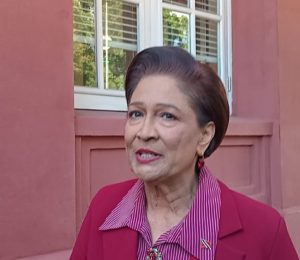
A FEW days ago, Prime Minister Dr Keith Rowley announced the pandemic was entering the endemic stage and among a loosening of Covid-19 restrictions was a requirement for public servants to return to their offices for work as of March 7.
Some confusion occurred thereafter when the Honourable Chief Justice Ivor Archie indicated court personnel (who are public servants) were subject to his directions and that he would examine the issue and let the public know his position on the matter.
This he did over this past weekend, when he issued his latest pandemic practice direction (#20) on court operations, which comes into effect from Monday March 14, 2022 and continues until further notice.
The most noticeable change from almost two years of pandemic practice directions is the resumption of jury trials for criminal cases. (There are no jury trials for civil cases in this country). For jury trials, social distancing must be adhered to, and no juror is required to sit shoulder to shoulder with another juror (which was how they sat in the pre-pandemic era).
Other than that, everything in terms of court operations remain largely the same. I quote Clause 5 of the practice direction verbatim as follows: “The general direction is that hearings and/or sittings shall be by electronic means and there shall be no in-person hearings save and except for circumstances where the interests of justice will not be served by a hearing by electronic means. For the avoidance of doubt, this shall include but is not limited to all sittings, hearings, case management conferences, pre-trial reviews, bail applications and remand hearings.”
Judges are only given a discretion to have in-person hearings when they are of the opinion that the interests of justice will not be served by a hearing by electronic means. Trials may fall into this exception, but it would have to be looked at on a case-by-case basis by the presiding judge. (Note – electronic means doesn’t just include video-link, but can be by telephone or any other means of instant communication between the court and parties.)
The method of filings remains the same. They must done electronically utilising the court’s e-services website. This is the case for all civil and criminal matters, probate matters, family court and magisterial or district matters, with some exceptions. As before, in-person appointments at the Court office still remain extremely limited. e.g., to lodge original paperwork for probate applications.
I have gathered from speaking extensively with my colleagues, we are all quite happy with case management conferences, hearings of applications and hearings generally that are not trials, being done virtually. These virtual hearings are exceptionally efficient in terms of time and costs, as lawyers and client alike do not have to waste time battling traffic to get to and from physical courts, finding parking spots etc. Ordinarily, too, they translate into savings for clients in terms of them being charged less billable hours for attendances at a hearing.
I, therefore, do not think it is a stretch of my imagination to say the legal profession is happy and relieved with the continued use of conducting hearings (not being the trial) via virtual means. But it seems that, contrary to the direction of our prime minister, many of the court staff will not yet be required to return to their physical offices of work.
Be safe Trinidad and Tobago.
Copyright © 2022 Neela Ramsundar, LLB (HONS), LEC is a Civil Litigation Attorney at Law & Certified Mediator.
Disclaimer: The contents of this article are for general informational purposes only and/or contain the opinions and/or thoughts of the writer only. It does not provide legal advice and does not create an attorney-client relationship with any reader. For legal advice on your specific situation, please contact an Attorney-at-Law of your choosing directly. Liability for any loss or damage of any kind whatsoever allegedly incurred a consequence of relying on content in this article is thus hereby excluded to the fullest extent permitted by law.
![]()












